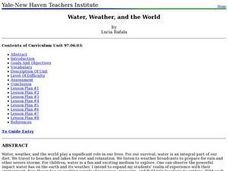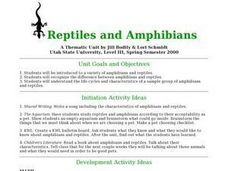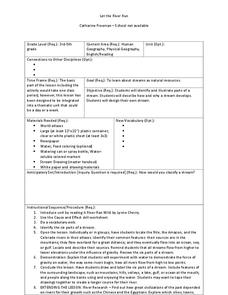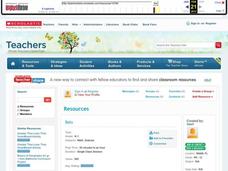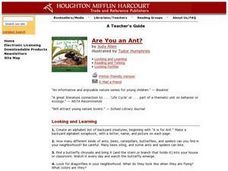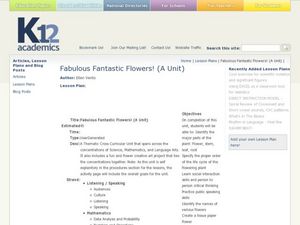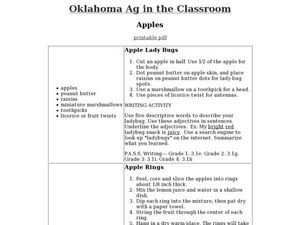Curated OER
Take A Walk On The Wildside
Students study big cats in a variety of lessons included in this unit.
Curated OER
Creatures of the Sea
Fourth graders complete a two-month long unit on the physical characteristics of the oceans and animal environments. They create a "Creatures of the Sea" alphabet book in collaboration with a kindergarten class, conduct Internet...
Curated OER
Twirly Whirly Milk
Student observe the effect soap (or detergent) has on the movement of food color in milk. Pupils observe the properties of solids and liquids while making butter. They read a poem, Shaking, and listen for ryhming words. Studdents...
Curated OER
Space
First graders examine space in this unit of lessons. They create a KWL chart and write in their journals about space. They also examine the phases of the moon and identify the constellations.
Curated OER
Water, Weather, and the World
Students in a special education classroom examine the role of weather and water in their lives. Each day, they add a symbol for the weather outside and identify the proper activities for the weather on that day. In groups, they...
Curated OER
The Human Skeletal System: Inside and Out
Students study bone size, structure and shape. They use various geometrical shapes to make a skeleton and produce a poster depicting the skeletal system and its functions. They arrange the pictures into the five sections, glue on...
Curated OER
The Anaconda
Students examine basic facts about the anaconda. They discuss the length of an anaconda, estimate the length of 33 feet, compare their estimate to the actual length, and decorate the paper snake with colored scales.
American Chemical Society
Isolation of Phytochrome
Why do soybean plants that are planted weeks apart in the spring mature simultaneously in the fall? Four independent activities cover the history of phytochrome research, scientist collaboration, the electromagnetic spectrum, and...
American Chemical Society
Joseph Priestley, Discoverer of Oxygen
Do you want to hear a joke about nitrogen and oxygen? NO. We all know there is oxygen in the air and that plants produce oxygen, but how was it discovered? Scholars read a handout, answer questions, and analyze material in the...
Curated OER
The High Cost of Chemical Dependency
Sixth graders explore, analyze and study the effect and impact that humans have on the environment based on their choices as individuals, businesses and governments. They assess the balance between human activities and aquatic pollution.
American Chemical Society
Norbert Rillieux, Thermodynamics and Chemical Engineering
The man who invented the earliest examples of chemical engineering was an American-born, French-educated, free man of color before the Civil War, and went on to translate Egyptian hieroglyphics. There is something of interest for almost...
American Chemical Society
The Discovery of Fullerenes
Carbon is the most common element on earth, so the innovative discovery of a new type of carbon molecule won the 1996 Nobel Prize. In the ready-to-go lesson plan, scholars learn about C60 and how it has opened up the entire area of...
Curated OER
Let the River Run
Learners explore the environment by reading a story in class. In this water formation lesson, students define environmental terms such as rivers, streams, gulf, oceans and lakes. Learners read the story A River Ran Wild and discuss the...
Curated OER
Bats
Students investigate bats. In this animal science lesson, students use several websites and suggested bat books to write an informative paragraph. Students should be able to write with 90% accuracy.
Curated OER
Beary O'Mometer Learns About Careers In Meteorology
Students explore the field of meteorology. In this meteorology lesson, students explore weather-related careers as they research the field of study as well as various weather concepts. Students interview meteorologists, write business...
Curated OER
Celebrating Our Connections Through Water
Students examine the role of water in ceremonies around the world. In this world history instructional activity, students explore how other cultures celebrate water. They create a Water Day for younger students to participate in.
Curated OER
Are You an Ant?
Students investigate different insects in their backyard. In this insect lesson, students read the book Are You and Ant? and apply the reading to their backyards. Students create a list of animals that begin with the the letter A an make...
Curated OER
Renewable/Nonrenewable Resources
Fourth graders classify resources as renewable or nonrenewable while playing a board game. They read King John story and discuss the story. Students explore renewable and nonrenewable resources. They play the resources game that show...
Curated OER
The Great Kapok Tree Debate
Students participate in a read aloud of the story, "The Great Kapok Tree" in which a logger decides not to cut down a tree. In small groups, they discuss and write about their opinion on the logger's decision. Each group then presents...
Curated OER
Photosynthesis
Fourth graders discuss and identify the components of photosynthesis and the products of this process. They participate in a class discussion about the importance of oxygen, and in small groups act out the process of photosynthesis. ...
Curated OER
Fabulous Fantastic Flowers!
Students study flowers and identify their major parts. In this flowers lesson plan, students research flowers, learn about their life cycle, label their major parts, and make tissue paper flowers.
Curated OER
From Seeds to Plants
Second graders review the process of plant reproduction and the role of seeds in that process. The students dissect a seed, analyze their finds, collect and record data, and make predictions about seed germination and plant growth.
Curated OER
Symposia: Scholarly Parties
Pupils hold a symposium during which students debate the benefits of democracy in ancient Greece and the United States. By doing this, pupils explain the role of symposia in ancient Greek culture and politics.
Curated OER
Apples
Second graders complete many cross categorical activities about apples. In this apples lesson plan, 2nd graders cook with apples, make a mobile, finger-paint, write a story about apples, and more. Students read poetry and complete math...






